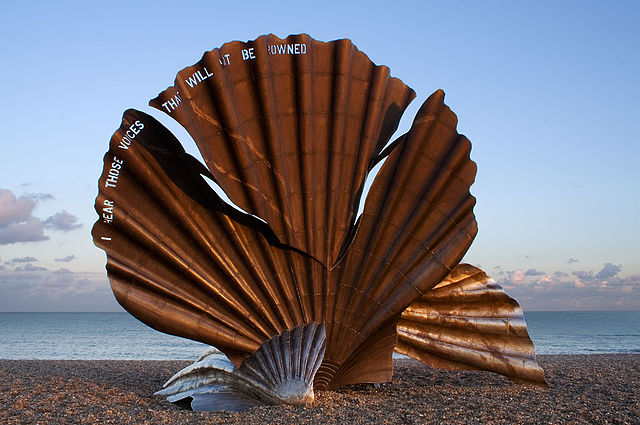Benjamin Britten 1913-1976
“I hear those voices that will not be drowned.”

The Scallop Shell at Aldeburgh
It is surely pertinent that this quotation, pierced in the steel of Maggi Hambling’s scallop-shell sculpture, is taken from the libretto of the opera Peter Grimes. The sculpture of 2003, which sits on Aldeburgh beach in Suffolk and is dedicated to Benjamin Britten, has caused much local controversy. The opera, a tragic work written in 1944, was just as controversial, but was responsible for parachuting Benjamin Britten to international recognition and acceptance.
Born in the coastal Suffolk town of Lowestoft on St Cecilia’s Day (November 22nd) 1913, and later described by Sir Thomas Beecham as “the only composer of any worth to emanate from any of our music colleges”, Britten led a controversial yet highly productive life. The son of a dentist and an amateur piano teacher (his earliest music lessons came from his mother), and the youngest of four children, Britten developed an appetite for composition at prep school, and by the age of fourteen he was a pupil of Frank Bridge. After senior school at Gresham’s, he entered the Royal College of Music, where he was taught by Ireland, Arthur Benjamin and Vaughan Williams. Early in his career Britten made a conscious effort to set himself apart from the English musical mainstream, which he regarded as insular and complacent. Contemporary critics distrusted his musical cosmopolitanism and his admiration for composers such as Mahler, Berg, Stravinsky and Shostakovich, who, in the early 1930s, were not considered to be suitable role models for a young English composer. Criticism of his early work inevitably became entangled with criticism of his character and integrity, in particular his pacifism, his left-wing politics, his sexuality and his well-documented attraction to young boys. (One cannot ignore the prominent position which is occupied by music for the unbroken, adolescent male voice in a significant portion of his output where such inclusion seems a little contrived.) For many, however, his technique as a composer, and in particular his ability to treat existing forms and structures with freshness and originality, place him high up the list of twentieth-century composers.